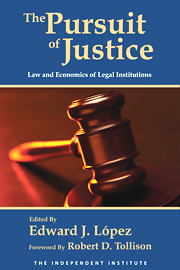Wine & Cheese Reception: 6:30 pm. Program: 7:00 pm
Admission: $15 • $10 for Institute Members
$35 Special Admission includes one copy of The Pursuit of Justice • $30 for members
Location: The Independent Institute Conference Center, 100 Swan Way, Oakland, CA 94621-1428
“If we want to reform the legal system, we must change the rules of the game so that the individual incentives of judges, lawyers, juries, and other legal actors motivate them to act in the larger social interest.” So argues Edward Lopéz in The Pursuit of Justice, a thoroughgoing book on government legal failure—the bureaucratization and politicization of the U.S. legal system and how the law really works in practice rather than in theory. From fingerprinting to criminal sentencing, from lawyer licensing to judicial selection, and from eminent domain to wealth transfers via class-action lawsuits, how do perverse incentives impact the law and what reforms would create a more just and efficient legal system? Join Professor Lopéz (San Jose State University), David Friedman (Santa Clara University), and Judge Alex Kozinski (U.S. Court of Appeals, Ninth Circuit) as they discuss the faulty incentives at the heart of legal failures and whether market-based reforms would create a more just and efficient system of law.

The Pursuit of Justice is a thoroughgoing analysis of the bureaucratization and politicization of the U.S. legal system and how the law works in practice rather than in theory. The book looks specifically at how decision makers in the law—judges, lawyers, juries, police, forensic experts, and more—respond to economic incentive structures. Faulty incentives lie at the heart of numerous failures of the U.S. legal system, but rather than the romanticized version of the law as portrayed in television dramas and in much academic research, the authors portray the legal system as it actually performs in practice.
This realism, in turn, provides the basis for reform proposals in a host of areas—from fingerprinting to criminal sentencing, from lawyer licensing to judicial selection, and from eminent domain to wealth transfers via class-action lawsuits. By looking at a range of important legal rules, their associated incentive effects, and the resultant outcomes, the authors here shed light on how perverse incentives result in the adverse outcomes of government failure, while also suggesting institutional reforms that would create a more just and efficient legal system.









